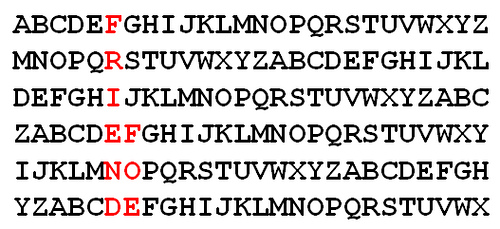
Author: Greg Ross
Unquote
“The only sin which we never forgive in each other is difference of opinion.” — Emerson
“A Most Determined Suicide”
A gentleman passing through the United States, on the Union and Pacific Railroad, was one morning telling the guard about a relative of his lately committing suicide. ‘Very sad, indeed,’ replied the guard, ‘but the most determined attempt at suicide happened the other day down Sacramento (California) way. A young man went down to the beach when the tide was out, with a long pole, sharpened at one end, and a hook in the other; he had also a rope with a noose in it, a phial of poison, a pistol, and a box of matches. He drove the pole into the sand, and climbed up it until the tide had risen high enough to drown him, when he swallowed the poison, set his trousers on fire, put the noose round his neck, and then fired his pistol. The bullet, instead of entering his forehead, grazed the top of his head and went through the rope; the rope, being weakened, snapped, and dropped the unfortunate man into the sea, which, of course, put the fire out, and swallowing some sea water made him vomit the poison, and in two or three minutes he was washed ashore alive, and only suffering slightly from the effects of his immersion.’
— Tit-Bits From All the Most Interesting Books, Periodicals and Newspapers in the World, Dec. 3, 1881
Small World

This one’s been tricky to write up because I can find so few sources. In a shed behind his farmhouse in Kent, electrical engineer Victor Martin apparently spent 50 years building a working replica of the London, Midland, and Scottish Railway as it existed in 1938. He started the project with his first wife in 1923 and continued it after retirement with his second wife, Louise, the daughter of a railroad stationmaster at St. Pancras. He arranged 500 engines and cars and nearly a mile of track; she added scenery, livestock, and people.
That’s just the beginning. For 30 years the Martins ran the railroad on a daily schedule, following the actual timetable used in St. Pancras in the 1930s. At Christmas they ran extra coaches to accommodate the holiday mail, and when the queen was traveling they included a royal coach on the line. During a national dock strike they added more freight trains, and during the Suez crisis of 1956 they stayed up all night running troop trains. (“Had to do it at night, you see,” Martin told a reporter, “for the secrecy.”)
How real must a model be before you’re a god? The denizens of Victor’s little world enjoyed perfect order until 1986, when Louise died and he cut back to a weekly schedule. Whether this was felt in 1938 is unknown.
… And Your Enemies Closer
Advance the last three letters of FRIEND one position in the alphabet and you get FOE:

“Courting in Church”
A young gentleman happened to sit at church in a pew adjoining one in which sat a young lady for whom he conceived a sudden and violent passion, and was desirous of entering into a courtship on the spot; but the place not favoring a formal declaration, the exigency of the case suggested the following plan: he politely handed his fair neighbor a Bible opened, with a pin stuck in the following text:
‘And now I beseech thee, lady, not as though I wrote a new commandment unto thee, but that which we had from the beginning, that we love one another.’
She returned it, pointing to the verse in Ruth:
‘Then she fell on her face, and bowed herself to the ground, and said unto him, Why have I found grace in thine eyes, seeing I am a stranger?’
He returned the book, pointing to the following:
‘Having many things to write unto you, I would not with paper and ink: but I trust to come unto you, and speak face to face, that our joy may be full.’
A marriage soon after resulted from this Biblical interview.
— Harper’s New Monthly Magazine, February 1867
Never Mind
“It has been asserted (by C.S. Lewis, for instance) that no determinist rationally can believe in determinism, for if determinism is true, his beliefs were caused, including his belief in determinism. The idea seems to be that the causes of belief, perhaps chemical happenings in the brain, might be unconnected with any reasons for thinking determinism true. They might be, but they need not be. The causes might ‘go through’ reasons and be effective only to the extent that they are good reasons.”
— Robert Nozick, “Reflections on Newcomb’s Paradox,” 1974
“If … [determinism] is true, then the intellectual or cognitive operations of its upholders, including their choice or decision to maintain the thesis, … are themselves only the effects of inexorable forces. But if this is so, why should the thesis … be accepted as valid or true?”
— Alan Gewirth, Reason and Morality, 1978
In for a Penny …

Prosper Mérimée is best known as the author of Carmen, the novella that inspired Bizet’s opera. But he began his career as an unknown writer in Paris in the 1820s, where a passing fad for Spanish literature led him to commit a modest hoax — he published Le Théâtre de Clara Gazul, a collection of plays supposedly written by a Spanish actress.
The effort worked: The plays were well received and launched Mérimée’s career. But some admirers wondered — if Clara Gazul doesn’t really exist, who is the fetching Spanish lady in the book’s frontispiece?
It’s Mérimée in drag.
Undefined

Another retrograde chess puzzle by Raymond Smullyan. The pawn on g3 is of unknown color. During the game no piece has moved from a light square to a dark one or vice versa. Is the unknown pawn black or white?
In a Word

ignivomous
adj. vomiting fire
